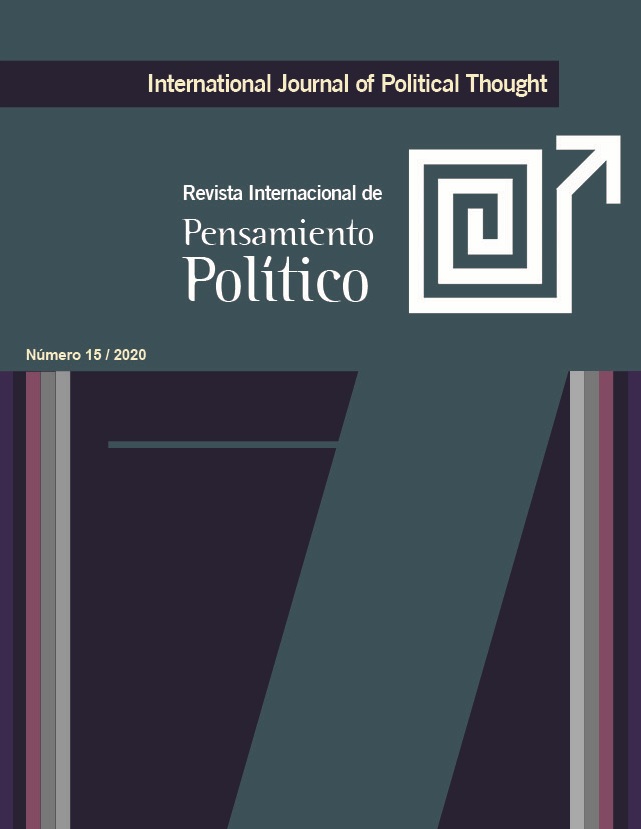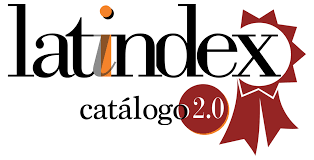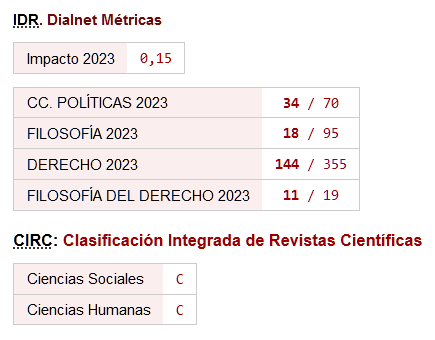¿Qué es una ontología política?
DOI:
https://doi.org/10.46661/revintpensampolit.5613Palabras clave:
Ontología, política, posfundacionalismo, deconstrucciónResumen
En este artículo me interesa presentar una definición posible de ontología política. Para ello, comienzo señalando cuáles son los rasgos generales desde los cuales se la define como mero antecedente de la epistemología. Frente a ello, primero, reconstruyo la perspectiva de W. Connolly como antecedente central del uso del término ontología en teoría política. Segundo, sistematizo bajo la expresión “ontologías políticas” ciertos modos en que se trabaja desde el posfundacionalismo el vínculo entre ontología y política. Tercero, bajo la expresión “políticas ontológicas” sistematizo las posiciones que han trabajado el vínculo entre ontología y política desde el giro ontológico en antropología. Por último, recuperando lo analizado, presento una definición de ontología política deconstructiva. El texto tiene, entonces, dos objetivos: por un lado, sistematizar las discusiones en torno al sintagma “ontología política”; por el otro, otorgar una definición específica de la misma
Descargas
Citas
Abbott, M. (2014) The figure of this world, Edinburgh, Edinburgh University Press.
Badiou, A. (1999) El ser y el acontecimiento, Buenos Aires, Manantial.
Balibar, E. (2014) Ciudadano-Sujeto, Buenos Aires, Prometeo, 2014.
Biset, E. y Farrán, R. (2011) Ontologías políticas, Buenos Aires, Imago Mundi.
Blaser, M. (2013) “Notes towards a political ontology of «environmental» conflicts”, Green, L. (ed.). Contested Ecologies: Nature and Knowledge, Cape Town: HSRC Press, pp. 13-27.
Butler, J. (2001) “Fundamentos contingentes: el feminismo y la cuestión del «postmodernismo»”, La ventana, N° 31, pp. 7-41.
Connolly, W. (1991) IdentityDifferen ce, Minneapolis, University of Minnesota Press.
Connolly, W. (1995) The ethos of pluralization, Minneapolis, University of Minnesota Press.
Connolly, W. (2008) Democracy, pluralism and political theory (editado por S. Chambers y T. Carver), Abingdon and New York, Routledge.
Connolly, W. (2013) The Fragility of Things, Durham, Duke University Press.
De Landa, M. (2002) Intensive Science and Virtual Philosophy, London and New York, Continuum.
Derrida, J. (1994) Márgenes de la filosofía, Madrid, Cátedra.
Derrida, J. (2008) Fuerza de ley, Madrid, Tecnos.
Derrida, J. (2013) Heidegger: la question de l’Être et l’Histoire, Paris, Galilée.
Descola, P. (2012) Más allá de naturaleza y cultura, Buenos Aires, Amorrortu.
Dos Santos, A. y Tola, F. (2016), “Ontologías: usos, alcances y limitaciones del concepto en antropología”, AVÁ 29, pp. 71-98.
Finlayson, A. (2010) Democracy and Pluralism. The political thought of William E. Connolly, Abingdon and New York, Routledge.
Groff, R. (2013), Ontology Revisited. London-New York, Routdledge.
Hay, C. (2006) “Political ontology”, Goodin, R. y Tilly, C. The Oxford handbook of contextual political analysis, New York, Oxford University Press, pp. 78-96.
Holbraad, M. (2011) “Can the Thing Speak?”, Working Papers Series #7, Open Anthropology Cooperative Press. pp. 1-26.
Holbraad, M. (2014) “Tres provocaciones ontológicas”, Ankulegi 18, pp. 127-139.
Holbraad, M. y Pedersen, M. A. (2017) The Ontological Turn, Cambridge, Cambridge University Press.
Holbraad, M., Pedersen, M. A. y Viveiros de Castro, E. (2014). “The Politics of Ontology: Anthropological Positions”, Fieldsights-Theorizing the Contemporary, Cultural Anthropology Online, January 13.
Janicaud, D. (2001) Heidegger en France, Paris, Bibliothèque Albin Michel.
Latour, B. (2008) Reensamblar lo social, Buenos Aires, Manantial.
Latour, B. (2011) “Il n’y a pas de monde commun : il faut le composer”, Multitudes, N° 45, pp. 38-41.
Latour, B. (2012) Nunca fuimos modernos, Buenos Aires, Siglo XXI.
Latour, B. (2013) Investigación sobre los modos de existencia, Buenos Aires, Paidós.
Latour, B. (2014) “Ensayo de un «Manifiesto composicionista»”, Fractal 76.
Latour, B. y Woolgar, S. (1995) La vida en el laboratorio, Madrid, Alianza.
Law, J. (2004) After Method, Abingdon and New York, Routledge.
Maniglier, P. (2016) “¿Cuántos planetas tierra?”, AVÁ 29, pp. 199-216.
Marchart, O. (2009) El pensamiento político posfundacional, Buenos Aires, FCE.
Mol, A. (1999) “Ontological politics. A word and some questions”, The Editorial Board of The Sociological Review, pp. 74-89.
Paipais, V. (2017) “Towards a Formal Political Ontology”, Contemporary Political Theory, pp. 501-531.
Paipais, V. (2017) Political Ontology and International Political Thought, London, Palgrave Macmillan.
Prozorov S. (2013) “What is the «World» in World Politics? Heidegger, Badiou and Void Universalism”, Contemporary Political Theory 12(2), May, pp. 102-122.
Rancière, J. (1996) El desacuerdo, Buenos Aires, Nueva Visión.
Rawls, J. (2010) “Justicia como imparcialidad: política, no metafísica”, Revista de Filosofía (México), 42 (127), pp. 11-46.
Schürmann, R. (2017) El principio de anarquía, Madrid, Arena.
Stengers, I. (2003) Cosmopolitiques 1-2, Paris, La découverte.
Stengers, I. (2014) “La propuesta cosmopolítica”, Pléyade 14, pp. 17-41.
Strathausen, C. (2009) A leftist ontology, Minneapolis, University of Minnesota Press.
Viveiros de Castro, E. (2015) “And”, The relative native, Chicago, Hau, pp. 39-54.
Viveiros de Castro, E. (2010) Metafísicas caníbales, Buenos Aires, Katz.
Viveiros de Castro, E. (2018) La inconstancia del alma salvaje, Buenos Aires, UNGS.
White, S. K. (2000) Sustaining Affirmation, Princeton, Princeton University Press.
Zevnik, A. (2016) Lacan, Deleuze and world politics, New York, Routledge.
Descargas
Publicado
Cómo citar
Número
Sección
Licencia

Esta obra está bajo una licencia internacional Creative Commons Atribución-NoComercial-CompartirIgual 4.0.
Política de acceso abierto
Se permite el acceso libre y abierto de cualquier interesado a todos los contenidos de los números de la revista, sin costo alguno, pudiendo imprimir y trasladar todos los artículos, con la única condición de precisar la fuente y la autoría.
La revista: a) no cobra a las autorías costes por el procesamiento de los artículos ni por el envío de los mismos, b) mantiene el copyright para los autores sin restricciones, c) facilita a los autores conservar sus derechos de publicación sin limitaciones.
La Revista Internacional de Pensamiento Político es una obra original del Laboratorio de Ideas y Prácticas Políticas de la Universidad Pablo de Olavide. Todos los artículos incluidos en la Revista son obra original de sus respectivas autorías. Esta Revista se ofrece libremente a la comunidad científica y académica sin coste alguno y libera los contenidos de acuerdo a la licencia "Reconocimiento-NoComercial-CompartirIgual 4.0 CC BY-NC-SA" del proyecto Creative Commons dispuesta en la siguiente url: https://creativecommons.org/licenses/by-nc-sa/4.0/legalcode
Si deseas traducir o compilar alguno de los artículos aquí disponibles, por favor, ponte en contacto













